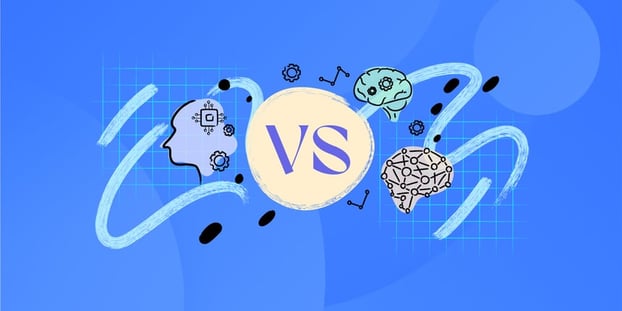Artificial intelligence vs. intelligent automation: are they the same? These are two of the most popular buzzwords in the technology industry today. Touted as the next big thing in business process automation, people often use them interchangeably. But can they be used synonymously?
There are significant differences between the two terms. Whether you're a business leader, technology professional, or simply curious about the future of automation, you should understand the distinction to make informed decisions about using these technologies. In this article, we'll take a closer look at artificial intelligence vs. intelligent automation, exploring their definitions, benefits, challenges, and use cases.
Artificial intelligence vs. intelligent automation: Definition and differences
Let’s start by defining both artificial intelligence and intelligent automation. Artificial intelligence (AI) is a broad field encompassing a range of technologies and techniques for building intelligent systems that can learn from data, make predictions, and perform tasks that usually require human intelligence. These systems typically use machine learning algorithms, which enable them to identify patterns and insights in large datasets and apply those insights to new situations.
On the other hand, intelligent automation (IA) is a more specialized form of AI that focuses on automating repetitive or rule-based tasks using software robots or bots. These bots can perform various tasks, from data entry to invoice processing to customer service interactions. Intelligent automation aims to streamline business processes and free up human workers to focus on higher-level tasks that require creativity and problem-solving skills.
So, what are their differences? While AI and intelligent automation are concerned with creating more efficient and effective systems, they differ in scope and underlying technologies. AI is a more general-purpose technology that can be applied to many domains and tasks, while intelligent automation is more specialized and focused on specific business processes.
Artificial intelligence vs. intelligent automation: Benefits and challenges
Artificial intelligence and intelligent automation have distinct benefits and challenges, and choosing between the two technologies depends on the business's specific needs. AI is better suited for tasks that require complex decision-making and adaptability. At the same time, IA is better suited for repetitive tasks that can be automated to increase efficiency and reduce errors.
Benefits of AI
- Adaptability: AI can adapt to changing conditions and improve over time.
- Accuracy: AI can perform tasks with greater accuracy than humans.
- Speed: AI can perform tasks faster than humans.
- Scalability: AI can be scaled up to handle large volumes of data and tasks.
- Decision-making: AI can analyze data and make decisions based on patterns that humans may not be able to detect.
Challenges of AI
- Lack of transparency: AI systems can be opaque and difficult to understand, making it hard to identify errors or biases.
- Data bias: AI systems are only as good as the data they are trained on, so the AI system will also be biased if the data is biased.
- Job displacement: AI can potentially replace human workers, leading to job losses in certain industries.
- Security: AI systems can be vulnerable to cyberattacks, which can have serious consequences.
Benefits of IA
- Efficiency: IA can automate routine tasks, allowing employees to focus on higher-level tasks.
- Cost savings: IA can reduce labor costs and increase productivity.
- Reduced errors: IA can reduce errors that humans commonly make.
- Scalability: IA can be scaled up or down to meet changing business needs.
Challenges of IA
- Lack of adaptability: IA is less adaptable than AI and may struggle with tasks requiring more complex decision-making.
- Limited scope: IA is best suited for repetitive, routine tasks and may not be as effective for more complex tasks.
- Resistance to change: Employees may be resistant to the implementation of IA, fearing job displacement or job reconfiguration.
- Maintenance and upkeep: IA systems require ongoing maintenance and updates to remain effective.
Artificial intelligence vs. intelligent automation: Use cases
Different industries are applying AI and IA because they have the potential to transform the way businesses operate and provide significant benefits in terms of efficiency, cost savings, and improved customer experiences. Here are some examples of their use cases:
Use cases of AI
- Healthcare: AI is used to analyze medical images and identify patterns that can help diagnose diseases. It can also develop personalized treatment plans for patients.
- Finance: AI is used to analyze financial data and identify patterns that can help detect fraud and make investment decisions.
- Manufacturing: AI is used to optimize supply chain management and improve production efficiency.
- Customer service: AI is used to provide personalized customer service through chatbots and virtual assistants that can handle routine customer inquiries and requests.
- Marketing: AI is used to analyze customer data and provide insights that can help improve targeted marketing campaigns.
Use cases of IA
- Human resources: IA is used to automate routine HR tasks, such as onboarding new employees and managing payroll.
- Manufacturing: IA is used to automate assembly line processes and quality control inspections.
- Finance: IA is used to automate invoice processing and accounts payable/receivable.
- Supply chain management: IA is used to automate inventory management and order processing.
- Customer service: IA is used to automate customer service inquiries and provide self-service options.
In some cases, industries can use AI and IA together to achieve even greater efficiencies and outcomes. For example, in a manufacturing setting, IA can automate routine processes, while AI can optimize production efficiency by analyzing data and making adjustments in real-time.
Wrap up
The debate of artificial intelligence vs. intelligent automation is an important one for businesses to consider. While these technologies can potentially transform businesses and drive growth, they also come with significant challenges and considerations. It's essential for organizations to carefully evaluate their options and focus on building a collaborative environment between human and machine workers.
As technology evolves, the lines between artificial intelligence and intelligent automation will become increasingly blurred, and businesses will need to stay informed and agile to keep up with these changes. By embracing these technologies thoughtfully and strategically, companies can unlock significant benefits and achieve a competitive advantage in their respective industries. Ultimately, the key to success lies in finding the right balance between human and machine intelligence, leveraging the strengths of both to create innovative and efficient processes that drive business growth and success.















